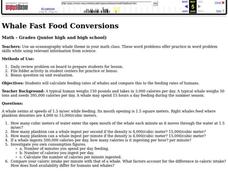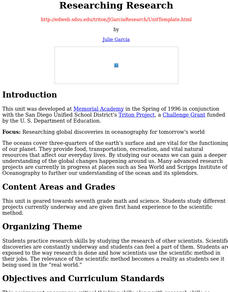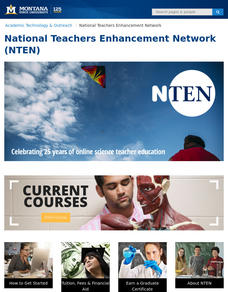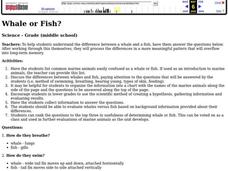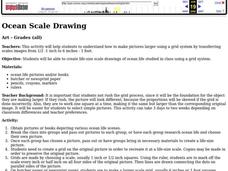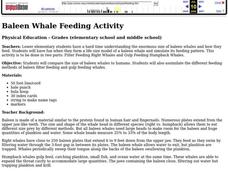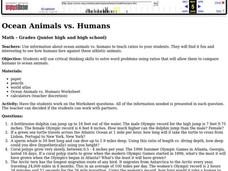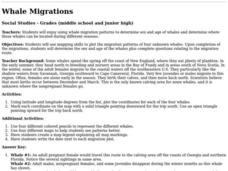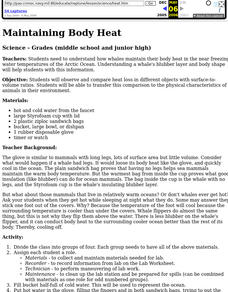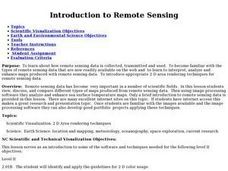Curated OER
Whale Fast Food Conversions
Students calculate feeding rates of whales and compare this to the feeding rates of humans.
Curated OER
Researching Researchers
Seventh graders use accessible technology to explore active research projects currently taking place, choose a current research project to study and create a presentation using the information that they have gathered.
Curated OER
Photography and Composition
Students examine the techniques and principles of photographic composition using various scientific tools such as a camera, a digital computer scanner, and a computer.
Curated OER
Writing about the world's fisheries (Calibrated Peer Review)
Students summarize the findings of the Pew Ocean Commission report "America's Living Oceans," contrast it to an opposing viewpoint, and recommend a fisheries policy based on their understanding. It includes a scoresheet that was created...
Curated OER
Whale or Fish?
Students explain the difference between a whale and a fish. After working through this themselves, they process the differences in a more meaningful pattern that overflows into long-term memory.
Curated OER
Cetacean or Fish?
Students cut out pictures from magazines of fish and cetaceans. They make a creative bulletin board labeling their pictures and identifying different features.
Curated OER
Water Pressure - Observing Water Flow
Students discover that pressure increases the deeper the ocean becomes. They determine how water pressure differs at various depths by observing water flow.
Curated OER
Measuring Aquatic pH
Students apply the scientific method and safety rules to aquatic pH. They test unknown solutions for pH levels.
Curated OER
Create an Underwater Scene
Learners apply knowledge of underwater ocean life by creating an ocean life scene with marine animals and plants placed at appropriate ocean depths.
Curated OER
Ocean Scale Drawing
Students explain how to make pictures larger using a grid system by transferring scales images from 1/2 -1 inch to 6 inches - 1 foot. They create life-size scale drawings of ocean life studied in class using a grid system.
Curated OER
Swim Like a Whale or Fish?
Students recognize the difference between whales and fish by categorizing them according to their method of swimming. They synthesize this information by simulating the swimming patterns of whales and fish and comparing it to their own.
Curated OER
Baleen Whale Feeding Activity
Young scholars compare the size of baleen whales to humans. They also assimilate the different feeding methods of baleen filter feeding and gulp feeding whales.
Curated OER
Sharks and Fishes
Learners explain the role of the school of fish as the prey and the shark as the predator, as they participate in the game Sharks and Fishes. They demonstrate quick physical movement, and trickery, by sucessfully staying away from the...
Curated OER
Ocean Animals vs. Humans
Students use critical thinking skills to solve word problems using ratios that allow them to compare humans to ocean animals.
Curated OER
Is There Seaweed/Algae in Your Food?
Students discover that seaweed/algae is a small part of the resources the oceans provide. By investigating common household products, students discover that human senses are not enough to detect the presence of seaweed/algae in food.
Curated OER
Whale Migrations
Students use whale migration patterns to determine sex and age of whales and determine where these whales can be located during different seasons. They use mapping skills to plot the migration patterns of four unknown whales.
Curated OER
Ocean Morse Code
Students gain knowledge of the maritime importance of Morse code and enjoy applying this information to decipher Morse code messages from other students.
Curated OER
the New Explorers:Into the Depths
Learners explore the self preservation mechanism that is inherent in the Great Lakes. They examine how scientists are studying Great Lakes, and what their predictions are for these national treasures.
Curated OER
Head to Foot
Students describe the body form and major anatomical structures of squids and describe some unusual or unique features of newly-discovered deep water squid species. They infer what types of food squids use from their anatomical features.
Curated OER
Maintaining Body Heat
Students observe and compare heat loss in different objects with surface-to-volume ratios. They transfer this comparison to the physical characteristics of animals in their environment. They focus on how whales maintain their body heat.
Curated OER
Water Density and Stability Lab
Students observe how different water densities and salinity control the depth at which different water masses occur. Submarines are used as a case study. This is a well-designed with an excellent worksheet.
Curated OER
Introduction to Remote Sensing
Learners view, discuss, and compare different types of maps produced from remote sensing data. They use image processing software to analyze and enhance sea surface temperature maps.
Curated OER
Health, Pollution, and Safety: Why Should We Care?
Students examine the impact of reducing the carbon dioxide emissions. They identify ways alternative fuels can lessen the effect of emissions on communities. Working in teams they conduct research from various community and Internet...
Curated OER
Beach Zonation
Students identify and separate the different zones of the beach by observation. They investigate beach zonation by gathering and comparing sand samples gathered from different areas of the beach.
Other popular searches
- Oceanography Science
- Oceanography Activities
- Oceanography Vocabulary
- Oceanography Tides
- Introduction to Oceanography
- Oceanography Exploration
- Oceanography Lab
- History of Oceanography
- Careers in Oceanography
- Oceanography Shells
- Geological Oceanography
- Oceanography Careers


